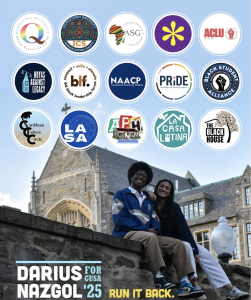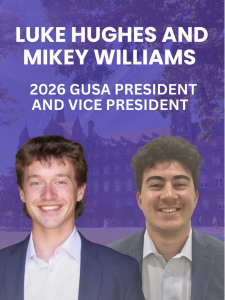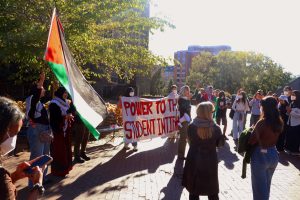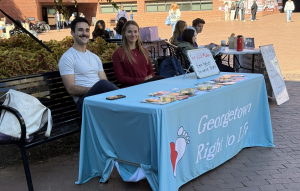About Us and Community Guide
About The Hoya
The Hoya is Georgetown University’s oldest and largest student-run newspaper. Since The Hoya’s founding in 1920, it has served as the university’s newspaper of record. The Hoya is produced, managed and edited entirely by undergraduate students and covers Georgetown University, the Georgetown neighborhood and the Washington, D.C. area. The Hoya is entirely editorially independent from Georgetown University.
The Hoya publishes articles every day online and prints biweekly on Fridays during the academic year, distributing 1,500 free copies to locations across campus and the Georgetown neighborhood. Content from our news, sports, science, opinion and features sections and our pullout The Guide, which covers arts and culture, is available online and in print; our multimedia content and our blog is available online. The Hoya also publishes newsletters containing our opinion, science, Guide and news content. We publish online exclusively during summers.
For more information, please visit our Frequently Asked Questions page.
The Hoya’s Community Guide
Welcome to The Hoya’s community guide. Inspired by similar guides from the Daily Bruin and the Daily Pennsylvanian, the student newspapers of the University of California, Los Angeles and the University of Pennsylvania, respectively, our editors have developed this guide to provide readers transparency on The Hoya’s policies, coverage and ethics.
Mission
The Hoya seeks to inform and spark discussion among readers in the Georgetown University community and surrounding neighborhoods, offer undergraduate students opportunities in journalism and business, and chronicle current events at Georgetown University with the utmost impartiality.
Funding
The Hoya is funded in part by independent advertising and in part from Georgetown University’s student activities fee. Funding from this fee is determined and distributed independently of the university administration — first by student government then by the Media Board, an independent student-run panel made up of members elected by each of Georgetown’s student publications.
The Hoya maintains and pursues business ventures which expand our ability to cover Georgetown University and the local community. We place advertisements in our print newspapers, website and on social media.
The Hoya reports on Georgetown University, student government, the Media Board and our advertisers without fear or favor. Financial considerations never factor into our reporting.
Leadership
The Hoya includes two student-run divisions: editorial and operations.
The editorial division has purview over The Hoya’s content and includes all editorial departments within The Hoya — news, features, opinion, sports, science, The Guide, design, social media, copy, blog, photo and multimedia. The editorial division is led by the editor-in-chief, currently Maren Fagan (CAS ’27).
The Hoya’s operations division has purview over The Hoya’s financial and business operations, including advertising, fundraising, accounting, technology and marketing. The operations division is led by the general manager, currently Peter Sloniewsky (CAS ’27).
The Board of Directors, which includes seven elected members, all former Hoya staff members, is the governing body of The Hoya and bears ultimate responsibility for The Hoya’s operations. The general manager and editor-in-chief serve on the board of directors. It is led by the chair of the board, currently Jack Willis (SFS ’26).
The Hoya’s staffers receive no pay; The Hoya employs no professional staff.
Join The Hoya
The Hoya hires for most entry-level positions in the editorial and operations divisions exclusively at the beginning of every semester. We practice open-access hiring through an interest form, which is open from late August to mid-September during the fall semester and from early to late January during the spring semester. Though some sections hire in limited numbers, there is a position for everyone at The Hoya.
The Hoya practices rolling open-access hiring for select entry-level positions. For these positions, the interest form is available all year round and new hires will be accepted on a rolling basis. We welcome all undergraduates to attend our News section pitch meetings Wednesday evenings during the academic semesters in our office, Leavey 421.
The Hoya is an undergraduate newspaper, meaning only Georgetown University undergraduates may hold staff positions. Graduate students, faculty and staff members, Georgetown graduates and other community members may contribute opinion pieces.
More information on The Hoya and our entry-level positions is available on our Join page.
Policies
The Hoya is committed to journalistic excellence and holds its staffers to journalistic ethics. We have chosen to publish these journalistic ethics policies to provide readers with transparency on our standards and allow them to hold us to account if we fail to meet them.
Anonymity
The Hoya grants anonymity in rare cases where it is otherwise impossible to find publishable information. We will only grant anonymity to sources in cases where the source can sufficiently prove they will risk legitimate harm (losing a job, financial aid or place on an athletic team, bodily harm, etc.) by offering The Hoya information. The Hoya discourages the use of information from sources who do not wish to be named; as such, where possible, The Hoya will include named sources in its reporting over sources who wish to be anonymous. In cases of anonymity, the source’s identity will be known only to the reporter, their editor and the editor-in-chief. The editor-in-chief retains final authority over decisions of anonymity.
Opinion pieces must be attributed to an individual. They may not be published anonymously, through an organization or under a pseudonym.
Why is this our policy? Overreliance on anonymous sources may harm The Hoya’s credibility and limit accountability. Anonymity is a last-resort option to protect sources at risk of serious harm.
Balance
The Hoya aims to present all sides of an issue. Our stories should contain comments from every group or individual named in the article, including Georgetown University, and other relevant groups. When we cannot obtain comment from named groups, articles must explain why.The Hoya requires at least three sources to speak directly to The Hoya for most news stories, with limited exceptions for Washington, D.C. or neighborhood stories.
Why is this our policy? The Hoya’s responsibility is to inform our readers and the Georgetown community. Imbalanced articles damage The Hoya’s credibility.
Conflicts of Interest
A conflict of interest occurs when a member of The Hoya’s staff has any actual or potential affiliation, interest or involvement with a person, club, business or group on which they seek to report. Every semester, staffers inform the Board of Directors about their involvement in any student groups or clubs and with any external activities which may conflict with their reporting. We ask all staffers to be fully transparent in order to avoid conflicts of interest.
Members of The Hoya’s staff may not report on organizations of which they are part or individuals with whom they have a personal or financial relationship. They may not be elected to positions within the Georgetown University Student Association (GUSA), nor may they endorse GUSA candidates or affiliate themselves with GUSA in any way on their personal social media accounts. They may not actively promote events of partisan political nature on social media or participate in marketing for Georgetown College Democrats, Georgetown College Republicans or any other club which is political or partisan in nature. They may not display public, overt preference on the issues they cover — for example, covering legacy admissions while publicly advocating for the university to end legacy admissions. They should not associate with or endorse national political issues as they relate specifically to campus life. Members of the board of directors, board of editors or operations directors are necessarily held to a higher standard on conflicts of interest.
Why is this our policy? Conflicts of interest threaten The Hoya’s impartiality and truthfulness, both by affecting what our staff writes, edits, photographs or designs and through creating the perception that our journalists are not credible.
Corrections
The Hoya will issue corrections in the case of inaccurate information at the time of printing. Corrected articles will include a note at the bottom specifying the date of the correction and what has been corrected. The Hoya will not issue post-facto corrections — if an article is factually correct as of press time, it will not be corrected.
The Hoya may also provide editor’s notes in certain cases, including but not limited to content warnings for articles that may be graphic or upsetting, context for sensitive articles or resources related to issues named in an article.
Plagiarism, Image Manipulation and Artificial Intelligence
Plagiarism: The Hoya expects that staffers’ published submissions are their own work. We do not tolerate plagiarism in any form.
Image Manipulation: The Hoya avoids image manipulation unless used to illustrate a concept. We may use modified photographs in illustrations, in which case we will note that the image is a photo illustration.
Artificial Intelligence: The Hoya does not permit the use of text written by or images generated by artificial intelligence (AI) in any written story unless the writer is using it to illustrate a concept or idea — for example, in this editorial. The Hoya does not permit our writers to use AI to draft or revise articles, and no AI-generated content should appear in the final form of any article. If AI-generated content is published, writers must explicitly state that it is AI-generated and attribute the AI platform which created it. The Hoya may use AI tools in data reporting or for search-engine optimization under human oversight. If a story or image is found to be in violation of our plagiarism, image manipulation or artificial intelligence policies, including using others’ work or AI-generated content without attribution, The Hoya will remove it from our site immediately.
Why is this our policy? It is a violation of journalistic ethics to publish information from any source without appropriate attribution. While The Hoya is exploring new ways to integrate technology into our newsroom, improper use of AI may expose the newspaper to copyright violations or break our promises to protect sources while allowing journalists to evade responsibility for their written products.
Retractions
Retracting an article
The Hoya does not retract stories or photographs once they have been published. We may delist certain articles written over five years ago to preserve the privacy of former Hoya staffers or individuals interviewed. The editor-in-chief retains final discretion over delisting articles and will make such decisions on a case-by-case basis. To request an article be delisted, please contact the editor-in-chief at [email protected].
Retracting a quote
The Hoya typically does not retract or anonymize quotes from articles written under five years ago. We may rarely retract or anonymize certain quotes from articles written over five years ago on a case-by-case basis if the quote’s publication presents a safety or privacy risk to a named interviewee. The editor-in-chief retains final discretion over retracting or anonymizing quotes and will make such decisions on a case-by-case basis. To request a quote be retracted, please contact the editor-in-chief at [email protected].
Why is this our policy? The Hoya’s retraction policy aims to balance the paper’s responsibility to record Georgetown University’s news and history with the concept of the “right to be forgotten.” To improperly retract stories, photographs and quotes edits that record. Yet The Hoya also aims to minimize harm to our interviewees and retains the power to delist articles and retract or anonymize quotes to protect past interviewees on a rare and case-by-case basis.
Reviewing Content Before Publication
The Hoya does not allow sources to review content before publication. In rare cases for sensitive stories, we will permit sources to view the direct quotes they provided to The Hoya.
Why is this our policy? We do not want our sources to influence what we publish or limit The Hoya’s editorial independence.
On and Off the Record
On the record: Interviewees give explicit consent for any quotes or information they provide to The Hoya to be used in an article.
On background: Interviews give explicit consent for information, not quotes, which they provide to The Hoya to be published without naming its specific source. The Hoya will only publish information that it receives on background if three unique sources confirm it independently.
Off the record: Interviewees do not give explicit consent for their quotes to The Hoya to be used in an article. Off-the-record interviews are important for reporters to improve their knowledge of a topic or gain familiarity with new avenues or angles for a story. The Hoya will not use information from off-the-record interviews in materials to be published.
Opinion and News Firewalls
The Hoya seeks to maintain a strict firewall between its opinion and news content.
- Columnists: Current columnists may not write for The Hoya outside of their columns.
- Editorials: The editorial board is responsible for composing the editorials that appear on the editorial page of each issue of The Hoya. Editorials are selected by a majority vote of the editorial board. The Editorial Board is made up of eight people — three Georgetown University community members with no affiliation to The Hoya, three current or former Hoya staffers and the two senior opinion editors, who chair the board.
- No senior editor or member of the news section may serve on the editorial board as a Hoya staffer.
- Community members are also obligated to excuse themselves from discussions of any outside organization to which they belong.
- Led by the opinion editors, the Editorial Board works together to draft editorials. Only members of the Editorial Board may draft editorials. A rare guest editorial must be labeled as such and the authors must be identified.
- The editor-in-chief holds final responsibility for and discretion over the content, scope and style of editorials.
- Staffers: Current writers and editors in the editorial division outside opinion may not write opinion pieces for The Hoya, with the exception of the outgoing editor-in-chief, who traditionally writes an “exit piece” in opinion for the final issue of their tenure.
-
- Opinion assistant editors and deputy editors may write one opinion piece per semester. Senior opinion editors may not write opinion pieces for The Hoya.
- Members of The Hoya’s operations divisions may write opinion pieces for The Hoya. However, if they choose to do so, they may not write news pieces for The Hoya during that semester.
-
Reader Comments
We encourage all readers to leave comments expressing their opinions and thoughts on the content of any article. It is our hope that readers will take the opportunity to contribute to relevant discussions through this interactive forum and share original thought and content with the online community. In order to keep our website and the discussions it hosts relevant, interesting and safe for all users, we ask that anyone who submits a comment abide by the outlined rules. By submitting content via the comments box, you are consenting to the following conditions.
To write a comment, please provide and verify your email. Comments on The Hoya’s website may not appear immediately.
Comments may not include inappropriate content. The Hoya deems a comment to be inappropriate if it:
- Degrades others on the basis of gender, race, class, ethnicity, national origin, religion, sexual orientation, disability or other classification
- Is predatory, hateful, intended to intimidate or harass, contains derogatory name-calling
- Is obscene, pornographic or sexually explicit
- Contains or advocates illegal or violent acts
- Contains advertising or a solicitation of any kind
- Contains false information
- Threatens a source’s or staffer’s privacy.
The Hoya reserves the right to moderate comments on our website and social media which violate these conditions. These decisions are ultimately subject to the editorial staff’s discretion.
Diversity
We recognize that The Hoya has not always been an inclusive space and that we have often failed to adequately represent marginalized communities in our pages.
We are committed to doing better, both in our coverage and in our newsroom. We are going to tell the stories The Hoya has neglected to tell in the past and increase the diversity of our sources. We also want our newsroom to be a space in which staffers of all backgrounds feel welcome. In this endeavor, we are actively seeking any criticism or suggestions from the Georgetown community so we can build a newspaper that is more representative of everyone at Georgetown.
Contact The Hoya
General contact information
- Email: [email protected]
- Editor-in-chief Maren Fagan: [email protected]
- General Manager Peter Sloniewsky: [email protected]
- Chair of the Board Jack Willis: [email protected]
- News editors: [email protected]
- Opinion editors: [email protected]
- Sports editors: [email protected]
- Social media:
- X, formerly Twitter: @thehoya and @thehoyasports
- Instagram: @the_hoya
- Facebook: facebook.com/thehoya
- YouTube: youtube.com/@TheHoyaOnline
- Mailing address
- The Hoya, 421 Leavey Center, Georgetown University, Washington, DC 20057
- Find our office
- Our home on campus is Leavey 421. To get to the office, take the elevators located near the Leavey Center’s east entrance, next to the Georgetown University Alumni and Student Federal Credit Union, to the fourth floor. Turn left when you exit the elevator, and you’ll find The Hoya’s office a few doors down on the right.
Corrections and Errors
If you wish to report an error in The Hoya’s coverage, please email us at [email protected].
Event Coverage
If you want The Hoya to cover your event at Georgetown University or in the surrounding area, email our news editors at [email protected] with the date, time, location and a brief description of the event. Please submit your event by the Wednesday before the event to ensure our news editors will be able to assign a reporter to your event. Events submitted after that deadline may not be accommodated. The news editors retain full discretion over whether to cover the event.
Story Ideas and News Tips
News story ideas and tips: [email protected]
Sports story ideas and tips: [email protected]
Other story ideas and tips: [email protected]
Opinion Pieces and Letters to the Editor
If you are interested in writing an opinion Viewpoint, email the opinion editors at [email protected] with your ideas and plans for a piece. We solicit pieces from all members of the Georgetown community, including students, faculty, staff, parents, graduates and neighborhood residents.
If you are interested in writing a letter to the editor, please visit our Letters to the Editor page. Letters can be submitted to [email protected].
Purchasing Photographs
Most photographs from The Hoya’s staff photographers which appear in The Hoya or on our website may be licensed or purchased as digital images. If interested, email our general manager at [email protected].
Placing an Advertisement
For information about advertising, please visit our Advertise page. The Hoya offers advertisements in print, online or on social media. Please direct any questions to our general manager at [email protected] or director of financial operations at [email protected].
Issues with Staff
If you have an issue with a Hoya staffer, please contact our Chair of the Board at [email protected] and our human resources director at [email protected].
Privacy Policies
The privacy policy for our website can be found here.
This page was last updated April 22, 2025.
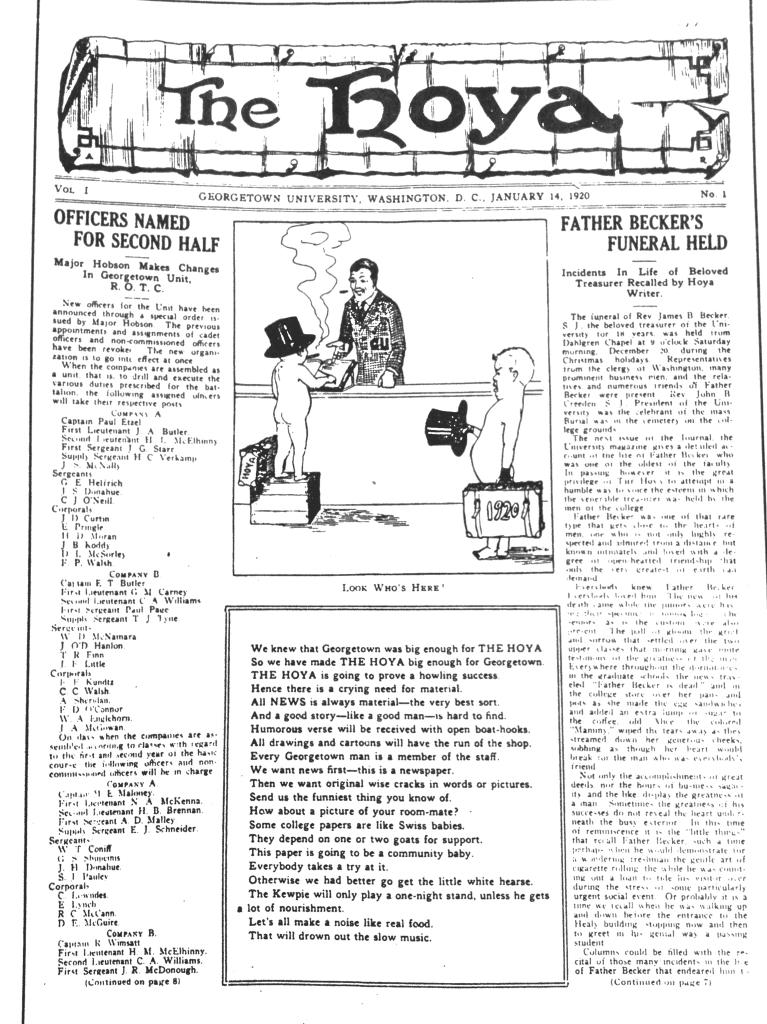
“Blushing as coyly as any schoolgirl, and with the excited fears and hopes of a debutante … we lay this first edition of The Hoya at the feet of the student body, and retreat to a safe distance to observe the effects.”
— Joseph R. Mickler Jr. (C ’20), The Hoya’s first editor-in-chief, in the paper’s debut issue.






